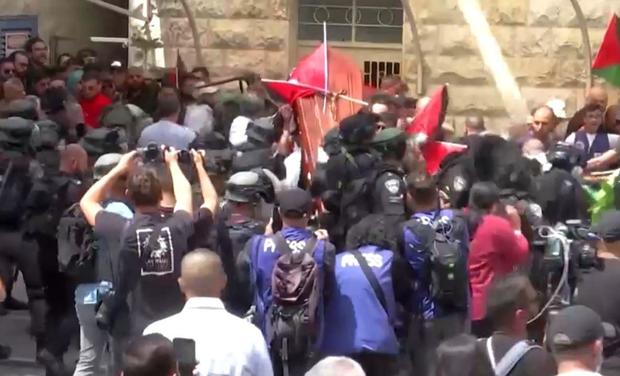Thousands of Palestinians flocked to Jerusalem to pay their final respects to Al Jazeera journalist Shireen Abu Akleh, killed two days earlier as she covered an army raid in the Israeli occupied West Bank at Ramallah. The violence that erupted was caught in live television footage and on cell phones. Israeli security forces attacked and beat the crowd carrying her coffin, which at one point was almost dropped by the pallbearers.
Al Jazeera said Israel had warned Abu Akleh’s brother to limit the size of the funeral procession, and that no Palestinian flags should be displayed and no slogans chanted in order not to provoke the crowds. The network said he rejected the warning. In any case it would have been impossible for him to control the crowds. Ms. Abu Akleh was a respected and even beloved journalist seen as a pioneer who told the hard truths that affect the Palestinian people and the outpouring of grief and anger over the reporter’s killing was powerful. “She was the voice of events in Palestine.”
Video clips aired on Al Jazeera — which has accused Israeli troops of deliberately opening fire on Abu Akleh — showed Israeli riot police pushing and shoving mourners outside a Jerusalem hospital and firing tear gas as people tried to carry her coffin outside the hospital’s morgue on Friday. Projectiles could be seen flying through the air as Palestinians chanted anti-Israeli slogans. Israeli forces ripped off Palestinian flags.
Both Israelis and Palestinians disclaim responsibility for the killing of the journalist, each claiming the bullet came from one of the opponents’ weapons. Israel had bolstered security in Jerusalem ahead of the funeral, as Palestinian officials continued to back Al Jazeera’s allegation that Abu Akleh was murdered by Israeli forces. The Palestinian Authority has refused to cooperate with Israel in investigating her death, despite calls from both Israel and the U.S. to do so, declaring a lack of trust in the integrity of the investigation.
The 51-year-old Palestinian-American journalist was killed by an apparent shot to the head as she covered clashes in the West Bank’s Jenin refugee camp, despite wearing protective equipment that clearly labelled her as a member of the press. While Israel’s leader initially claimed it was “likely” she had been hit by fire from Palestinian gunmen firing uncontrollably, the country’s military chief accepted the following day that it could have been a shot from an Israeli soldier.













